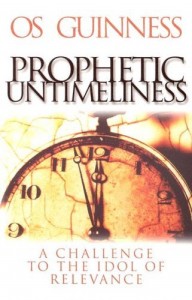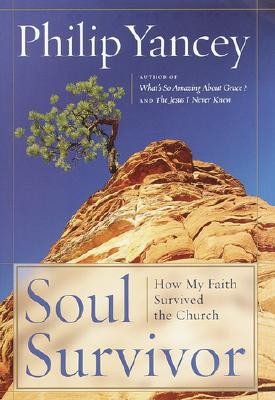Prophetic Untimeliness
 In Prophetic Untimeliness: A Challenge to the Idol of Relevance (2009), Os Guinness explores the fascination with relevance that permeates evangelicalism, diagnosing it as a result of our uncritical immersion in our current view of time. He summarizes the problem in two densely woven sentences:
In Prophetic Untimeliness: A Challenge to the Idol of Relevance (2009), Os Guinness explores the fascination with relevance that permeates evangelicalism, diagnosing it as a result of our uncritical immersion in our current view of time. He summarizes the problem in two densely woven sentences:
The faith-world of John Wesley, Jonathan Edwards, John Jay, William Wilberforce, Hannah More, Lord Shaftesbury, Catherine Booth, Hudson Taylor, D.L. Moody, Charles Spurgeon, Oswald Chambers, Andrew Murray, Carl Henry, and John Stott is disappearing. In its place a new evangelicalism is arriving in which therapeutic self-concern overshadows knowing God, spirituality replaces theology, end-times escapism crowds out day-to-day discipleship, marketing triumphs over mission, references to opinion polls outweigh reliance on biblical exposition, concerns for power and relevance are more obvious than concern for piety and faithfulness, talk of reinventing the church has replaced prayer for revival, and the characteristic evangelical passion for missionary enterprise is overpowered by the all-consuming drive to sustain the multiple business empires of the booming evangelical subculture.
The book begins by reviewing of the historical impact of clock-time, examines the ways it has shaped our values and concepts theologically, and offers a 3-part prescription for finding a perspective not held captive to our present culture:
- Cultivate an awareness of the unfashionable.
- Know history.
- Pay constant attention to the eternal.
The gospel, he points out, is eternally “relevant” or it’s not good news at all. Our concern is not to “make it relevant,” but to be faithful to its message amidst the whirl of our time. In this way we can be something like the prophets of old, who often didn’t feel at home in their times but who were faithful to proclaim God’s truth.
Last night during a long car ride, I read the “solution” section aloud to my husband. I’ve tossed out blurbs to him here and there as I’ve been reading the book, and he wanted to hear it. It was an interesting experience, and it made me realize what a good book this would be to read with a group.
My husband complained that Guinness “paints with a broad brush” — he makes sweeping statements about periods of history, and about present-day church and culture. But to me, this is the delight of reading Guinness. He is so well-read and such a master of his subject that he can make such generalizations as a way of contextualizing his statements. His failure to support them in detail here results not from failure to have support, but from a decision to keep the focus clear and narrow (the book is only 119 pages long). But it was lots of fun to read aloud and be stopped so often to process and clarify.
It’s also only fair to add that my husband’s view, after hearing only the last section of the book, is that Guinness criticized extensively and solved minimally; his solutions (above) were not as thorough and developed as my husband would have wanted to see. But I didn’t feel that way. Maybe they seem undramatic because we are already cultivating them in various ways in our lives. But as ways of tying down our perspective in points outside the limits of culture — or, as Guinness puts it, of finding “an Archimedean point of leverage outside of history and society” — all three are effective disciplines to cultivate. As Christians we have one foot in eternity and one foot in time, and we need to be well balanced between them.
This is my third book by Os Guinness, and I always appreciate the elegance and wit of his thinking. There may be points here and there that I quibble with, but the overall effect of reading one of his books is intellectually astringent. There are insights large and small, breadth and depth and erudition that challenge and inspire. I would recommend this book to any evangelical for its power to startle, awaken, provoke and motivate.




5 Comments
Amy @ Hope Is the Word
Sigh. This sounds like another author to add to my TBR stack. :-)
Barbara H.
Love this: “The gospel, he points out, is eternally ‘relevant’ or it’s not good news at all. Our concern is not to ‘make it relevant,’ but to be faithful to its message amidst the whirl of our time.”
hopeinbrazil
I’ve had Guinness on my radar for awhile. This sounds like a great book.
Sherry
I’ve not only had Guiness on my radar, I’ve had this particular book on my TBR list for some time. But I haven’t been able to find a copy at the library or the bookstore. I guess it’s time to look at Amazon.
Pingback: